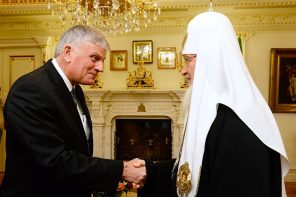James Wellman Jr., a religion professor at the University of Washington, co-wrote Religion and Public Life in the Pacific Northwest: The None Zone which helped seal a national perception of the country’s northwest corner as a spiritual wasteland.
For his most recent book, Evangelicals vs. Liberal: The Culture Clash of Christian Cultures in the Pacific Northwest, Wellman profiled nearly 30 evangelical and liberal northwest churches finding that evangelical churches are growing at breakneck speed, while churches that more closely reflect the region’s traditional liberal values are struggling. Religion Dispatches asks Wellman, a self-described liberal, why doctrinally conservative churches are thriving, and what liberal churches could learn from them.
What are some misconceptions about the Pacific Northwest’s religious landscape?
James Wellman: There’s general ignorance about the Pacific Northwest. The northwest is unique precisely because it is so unchurched. Two in three people in the country are affiliated with a religious organization, but only one in three people in the northwest. You really have an open religious market. However, most people believe in God and are generally spiritual. About a quarter of the people are evangelical, and about a quarter of Northwesterners have no religion, so the two subgroups are people who are non-religious and people who are intensely religious. Those who do go to church are more loyal and more intentional and conscious about their faith. That’s true for both evangelicals and liberals. There’s a general feeling that the northwest is liberal, but I think it’s a place where people just want to be alone.
What are the hallmarks of liberal and evangelical churches?
For liberals, Jesus is inclusive and hospitable to all people, and a reconciling figure who creates a sense of acceptance and love and leads one to do justice in the world. They tended to be open to gay and lesbian people.
For evangelicals, the primary conviction is that Jesus Christ is Lord and Savior, and that he died for their sins is a fundamental, core belief. They do a great deal of social service—more than liberal churches do.
The evangelical churches in your study grew by 90 percent over five years. Why?
In evangelical churches there’s a focus—an obsession, almost—with family and reproducing more kids. They’re out-reproducing liberals by two to one. Some churches actually talk about reproducing, growing by reproducing. They’ve created family culture, and they do that really well. You see a closer split between males and females in evangelical churches, and they’re intentionally reaching out to young people.
Why are liberal churches declining?
Liberal churches, more or less, are for post-60-year-olds. What I’d say to liberal churches is that it’s not a bad thing to have a mature congregation, but don’t fool yourself into thinking that you’re actually doing something that you’re not.
They also have to find a positive message. Liberals are good at saying, “We’re not fundamentalist, we’re not sexist, we’re not homophobes, we’re not warmongers, we’re not narrow-minded.” And you ask, “Well, what are you?” And you’ll get a stunning silence. It’s a fairly weak message.
Describe the scene you found on Sunday mornings in northwest churches.
In evangelical churches, you often felt like you were at Alcoholic’s Anonymous. A lot of people who were really broken felt healed. In general you hear an upbeat contemporary worship services dominated by upbeat music, art, media, and a pastor who will talk about the Bible make practical comments about how the Bible applies to your life. There’s also a lot of joy in evangelical services, and liberal services miss that.
In liberal churches, for the most part it’s fairly traditional liturgy. They were much more sober and, to some extent, boring. It’s somewhat sophisticated and upper-middle class aesthetics. The sermons mention scholarship and Time Magazine as much as it mentions the Bible.
Are northwest evangelical churches aligned with the religious right?
With evangelicals, we never found a theocrat or a fascist. They’re very loyal to certain politicians, but very suspicious of politics. Some evangelical pastors were exceptionally critical of the politicians they’d voted for, mostly because they didn’t get what they wanted. Abortion is not illegal, Roe v. Wade has not been defeated, gay orientation seems to be spreading and normalized. Those are all huge problems for evangelicals. But the evangelicals will look at it and say, “The government is not the answer. The answer is a changed heart.”
Do evangelicals feel attacked by liberals, and vice versa?
Liberals are frustrated with the fact that the only moral voice in the public square is supposedly from the evangelical community. On the other hand, evangelicals have some real fear that their principled points of view on abortion and on the gay issue are misinterpreted as hate speech.
Could the growth of evangelical churches in the northwest signal a shift in the political landscape in that region?
Most northwesterners are not liberal, but libertarian. They do what they want, and they’re not loyal to parties. They’re loyal to their interests. To say what’s happening with churches in the northwest is a harbinger of the future, that may be exaggerated. I don’t think there’s any sure thing. The important thing I found I think is that liberals will either learn from evangelicals or they’ll continue knocking on death’s door.
—-
Read More of RD’s Book Coverage on our Book Page.




